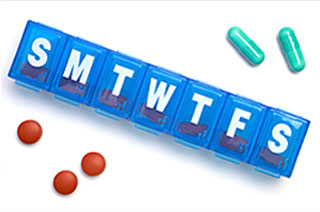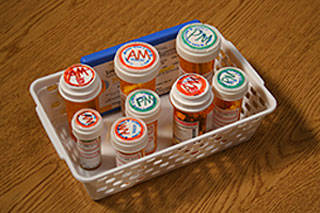Safety Tips

Taking Medicines Safely
- Never take another person’s medicine.
- Make sure each of the doctors your family member visits knows all of the medicines he or she is taking. Take a list of medicines with you.
- Use one pharmacy for all your prescriptions. The pharmacist will help you keep track of all the medicines the person you care for is taking.
- Take all medicines for the full time prescribed.
- Do not give a medicine past the expiration date or more than a year old.
- Do not place different medicines in the same storage container. Exception: you can mix medicines when you use a weekly pill box
- Often persons take multiple medicines. Use a color coding system to keep track of the time of day you need to take which medicine.
 You can also use a permanent colored marking pen to label the tops of containers for medicines that are to be taken at the same time.
You can also use a permanent colored marking pen to label the tops of containers for medicines that are to be taken at the same time. - Give all of a prescribed medicine. This is especially important for antibiotics and blood pressure medicines. Do not save for a future illness.
- Be sure all medicine containers are clearly labeled. If not, take the container to the pharmacist for a new label. You can also ask for larger print on the labels.
- Check to see if a medicine needs to be given alone or if it can be given with other medicines and food. Certain foods, drinks, and medicines cannot be taken together.
- Have the person you care for keep a current list of all medicines and any medicine allergies on a wallet card. Have them keep the list with them at all times.
- Store medicines in a safe place, away from children. If children live in or visit the home often, place the medicine in a place out of their reach or in a locked box or cabinet.
- Use the kitchen to store medicines. Avoid the bathroom since moisture can cause medicines to soften. Do not store medicines on a windowsill, in direct sun light or an area of extreme temperature.
- Keep liquids and injection medicines such as insulin or heparin in a cool place for storage.
- Store medical supplies such as syringes or measurement devices in an airtight container, such as a plastic storage bin. Choose a cool place like your bedroom closet.